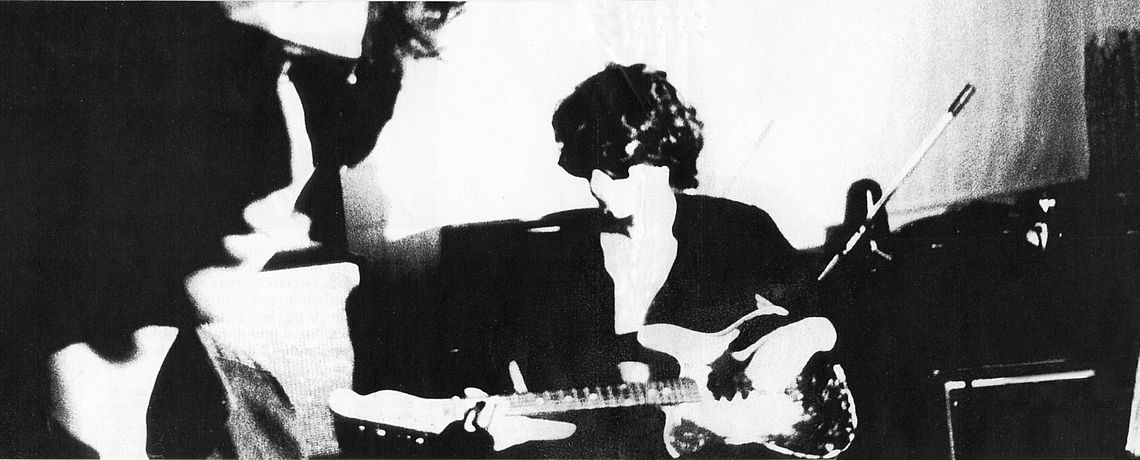The 39 Clocks
Next Dimension Transfer (Boxset, out March 22nd, 2019)
Contains: 5 album box set: two regular studio albums, two collections of outtakes, leftovers and rarities (one of them renamed, edited and updated by The 39 Clocks exclusively for this box set) plus a previously unreleased live LP from 1981 Furthermore: includes comprehensive deluxe booklet (“Revelations”) featuring mind-blowing new trivia and secrets (vinyl: 28 pages, CD: 44 pages)
The 39 Clocks are one of the most magnificent bands ever to have emerged from Germany; Diedrich Diederichsen, German pop boffin, considers them to be the nation’s best band of the 1980s. The legendary duo from Hanover broke every rule in the music business, without exception. And – above all – with attitude. The very appearance of the Clocks was beyond compare: the odd grainy black and white photograph reveals two wiry figures in Beatnik attire and sunglasses. They are elusive, incapable of being categorized, unless the category is a little bit weird. Their real names have been eradicated (“never had one” – Clocks), replaced by cryptic initials (CH-39, JG-39), less than randomly reminiscent of molecular chains like LSD-25. The weirdness is reflected in their music: sizzling irradiated, repetitive.
The outrageous rumours surrounding the duo are the stuff of legend: strung out live performances with vacuum cleaners instead of guitars, frequently facing a throng of concertgoers with a tendency to boo, flee the venue or threaten them with physical violence. Sometimes exasperated promoters simply pulled the plug (literally). So many stories.
The Clocks project really began to take shape in 1979 when they turned away from punk and created “psycho beat”, positioning themselves as the antithesis of the emerging NDW/German New Wave movement. Their music is a futuristic, definitively urban, evolution of American garage punk from the 1960s. Their stylistic modus operandi: expressionless voice, English lyrics with an intentionally heavy German accent, dirty sound, cool monochrome image.
Those lacking in imagination might identify touches of the Velvet Underground and stop right there, but many other influences were also at work: from Salvador Dali via the Troggs, Suicide, Peter Handke’s Offending The Audience, Antoine to Tiny Tim, Kurt Schwitters, Can and NEU! The Clocks themselves spoke of “at least 123” sources of inspiration. In early 1980s Germany, the 39 Clocks were, at one and the same time, a panoply of discernible influences and a singular phenomenon with a clear, inimitable sonic identity. Time and again, the 39 Clocks succeeded in pushing back the borders of experimentation a little further: barely tolerable, protracted live improvisations, atonal passages, background noises, extreme lo-fi and a tinny beatbox test the listener’s receptivity to the limit.
And yet: the Clocks’ radicalism earned them worldwide acclaim. Their records were sought after in such far- flung countries as England, Greece and the USA. And their sonic experiments popped up in various film soundtracks, including “Nightfall”, “23 – Nichts ist so, wie es scheint” and television series like “Halt and Catch Fire” in the US.
The “Next Dimension Transfer” box set, authorised by the band, provides the ultimate overview of the Clocks’ output – a phantom of the German music underground, enshrouded in myth.
Deutscher Pressetext
Die 39 Clocks sind eine der grandiosesten Bands, die Deutschland hervorgebracht hat; der deutsche Popintellektuelle Diedrich Diederichsen bezeichnete sie als die beste deutsche Band der Achtziger. Das legendäre Duo aus Hannover verstieß gegen alle Regeln des Musikbusiness, aber das mit Konsequenz. Und – vor allem – mit Haltung.
Schon das Auftreten der Clocks suchte seinesgleichen: Auf mitunter grobkörnigen Schwarz-Weiß-Bildern sehen wir zwei dünne, in Beatnik-Schwarz gekleidete Gestalten. Sie tragen Sonnenbrillen, sind nicht fassbar und nicht einzuordnen, kurzum: ein bisschen unheimlich. Passenderweise wurden ihre bürgerlichen Namen eliminiert („nie welche gehabt“ – Clocks), an deren Stelle traten kryptische Initialen (CH-39, JG-39), die nicht von ungefähr an Bezeichnungen für Molekülketten wie LSD-25 erinnern. Das Unheimliche spiegelte sich in der Musik: brutzelnd, verstrahlt, repetitiv.
Die haarsträubenden Gerüchte über das Duo sind Legende: zugedröhnte Live-Auftritte mit Staubsaugern statt Gitarren, regelmäßig in Scharen buhende oder flüchtende oder aber mit physischer Gewalt drohende Konzertbesucher, Konzertveranstalter, die der Band verzweifelt den Strom abstellten, und dergleichen mehr.
Die Konturen der Clocks zeichneten sich ab, als sie sich 1979 vom Punk abwendeten und den „Psycho Beat“ erfanden. Sie waren der selbst definierte Gegenentwurf zur damals aufkommenden Neuen Deutschen Welle. Ihre Musik ist eine futuristische, definitiv urbane, weiterentwickelte Form des US-Sixties-Garage-Punks. Ihre Stilmittel: ausdruckslose Stimme, englischer Gesang mit absichtlich starkem deutschem Akzent, schmut- ziger Sound, cooles Schwarz-Weiß-Image. Fantasieunbegabte hören vielleicht lediglich Velvet-Underground- Anleihen heraus, tatsächlich waren verschiedenste andere Einflüsse prägend: von Salvador Dali über die Troggs, Suicide, Peter Handkes Publikumsbeschimpfungen, Antoine bis zu Tiny Tim, Kurt Schwitters, Can und NEU. Die Clocks selbst sprachen von „mindestens 123“ verschiedenen Inspirationsquellen. Bei allen erkenn- baren Einflüssen waren die 39 Clocks Anfang der 80er in Deutschland auch gleichzeitg ein ausgesprochen singuläres Phänomen mit deutlich erkennbarer Soundidentität. Die 39 Clocks haben es auch immer wieder geschafft, die Grenzen des Experimentellen noch ein Stück zu erweitern: Schwer erträglich lange Live-Impro- visationen, atonale Passagen, Störgeräusche, Extremst-Low-Fi und die blecherne Beatbox strapazierten die Hörgewohnheiten mitunter aufs Äußerste.
Und doch: Die Radikalität der Clocks fand weltweit Verehrer. Ihre Tonträger waren und sind unter anderem in England, Griechenland und den USA gefragt. Und ihre Klang-Experimente tauchen in verschiedenen Film-Soundtracks auf, zum Beispiel in „Nigthtfall“, „23 – Nichts ist so, wie es scheint“ oder der US-TV-Serie „Halt and Catch Fire“.
Das Boxset „Next Dimension Transfer“ wurde von den Clocks autorisiert und liefert den ultimativen Überblick über das Œuvre dieser bis heute mythenumrankten Phantome des deutschen Musik-Untergrunds.













